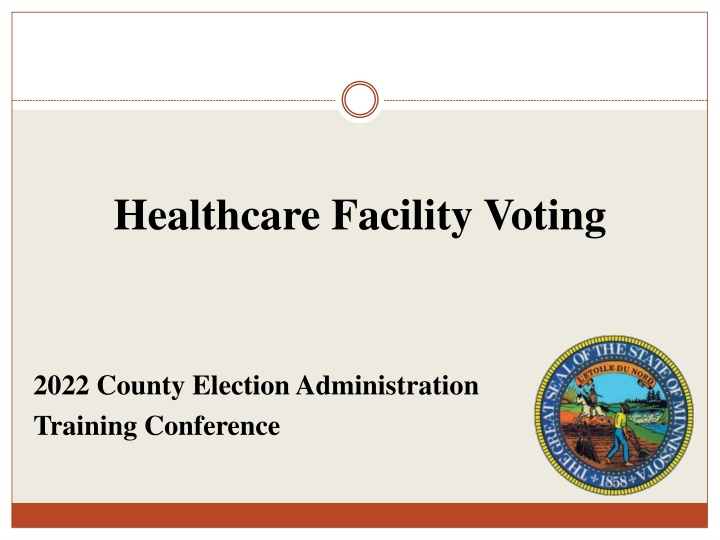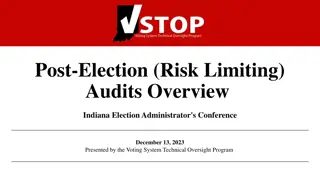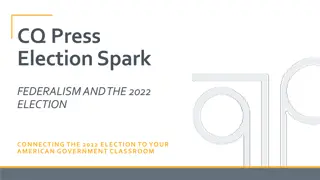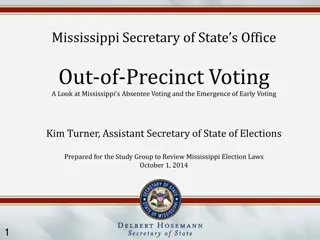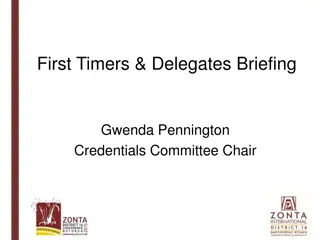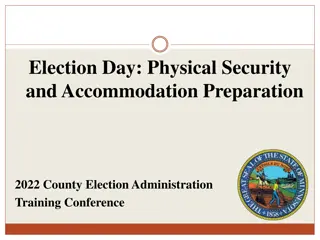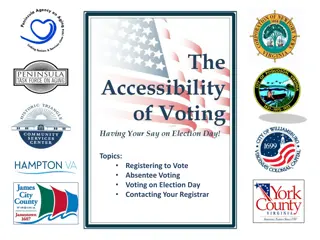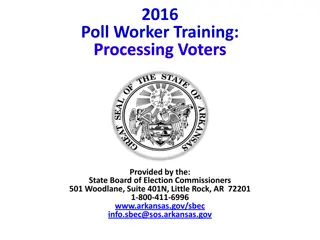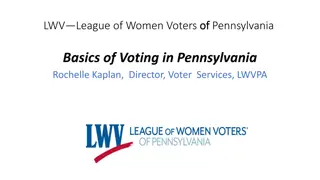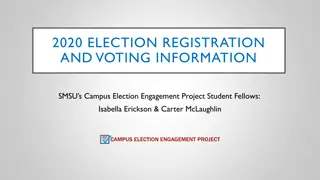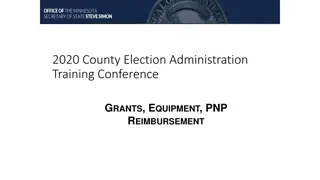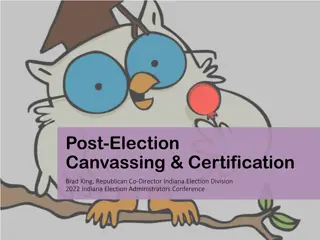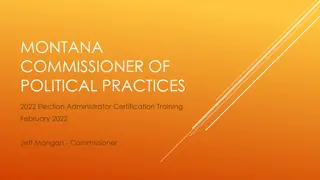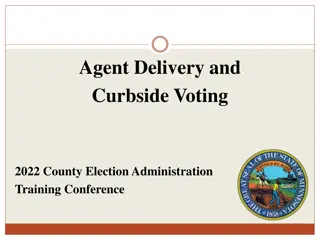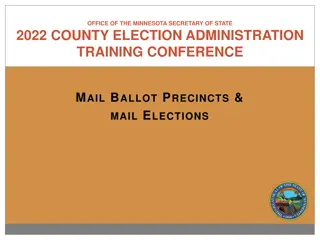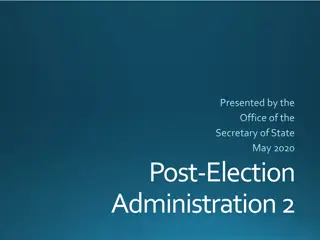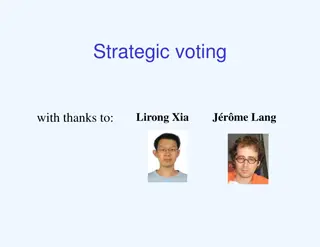Healthcare Facility Voting Guidelines and Procedures for 2022 County Election Administration Training Conference
Learn about the essential processes related to Healthcare Facility Voting for the upcoming 2022 County Election Administration Training Conference. Topics include eligibility criteria, agent delivery voting, HCF voting requirements, changes in COVID-19 policies, and the roles of administrators and HCF staff in facilitating the voting process.
Download Presentation

Please find below an Image/Link to download the presentation.
The content on the website is provided AS IS for your information and personal use only. It may not be sold, licensed, or shared on other websites without obtaining consent from the author.If you encounter any issues during the download, it is possible that the publisher has removed the file from their server.
You are allowed to download the files provided on this website for personal or commercial use, subject to the condition that they are used lawfully. All files are the property of their respective owners.
The content on the website is provided AS IS for your information and personal use only. It may not be sold, licensed, or shared on other websites without obtaining consent from the author.
E N D
Presentation Transcript
Healthcare Facility Voting 2022 County Election Administration Training Conference
Agenda What is Healthcare Facility Voting? Eligibility Agent Delivery HCF Voting Requirements Changes in COVID Policies Roles of Administrators and HCF Staff Training Clerk Duties and Outreach SVRS Screens and Processes Discussion
What is Healthcare Facility Voting? Minnesota election law (MS 203B.11) provides several processes for hospital patients, residents of health care facilities and other who have difficulty getting to the polls to receive an absentee ballot. These processes are: 20-day health care facility outreach Election day health care facility outreach Agent pick-up and return The official carrying out the duties of Minnesota Statutes Chapter 203B is responsible for administering these processes. M.S. 203B.04, subd. 2
Eligibility Health Care Facility Definition Health care facilities (HCFs) mean hospitals, residential treatment centers and nursing homes governed by M.S. 144.50. M.S. 203B.01, subd 4 Confirm a facility s status by calling its administrator or by checking the Minnesota Department of Health s Directory of Licensed and Certified Health Care Facilities Potential reasons for voter ineligibility MS 201.014 Temporary resident lives outside the district Resident under a guardianship HCF staff might communicate these situations to you with permission With HIPAA laws they cannot automatically provide this information
Agent Delivery Voting Available for temporary residents who are not eligible for HCF Voting Process: An agent can pickup and return an absentee ballot for a patient during the four days preceding an election, and until 2 p.m. on Election Day The voter must authorize the agent in writing; the authorization can be combined with the application. You may email/fax the application to the voter, and the voter may return it by email/fax. Ballots returned under this provision must arrive back by 3:00 p.m. on Election Day. (M.S. 203B.11)
HCF Voting Requirements Resident s AB application must be received before an AB Ballot can be delivered This process takes place within 20 days prior to Election MS 203B.11, sub. 2 Election Judges must go to facilities at least once during the time period Even if applications are not on file yet Even if facilities have stated no one is going to vote Must go and sit, making announcement that voting is available Must ensure voters can vote in private Can be set up in a lobby type situation with good air flow, etc. as long as people are able to vote in private
Changes in 2020 COVID-19 Policies HCF Voting Staff cannot be used to administer elections, like 2020 Previously had training to administer residential balloting, but this is no longer the case The legislation that allowed this expired with the 2020 elections
Roles of Administrators and HCF Staff Municipalities Municipal clerks are the primary administrator of HCF Voting This includes communicating with the facility, planning, and sending election judges Counties If the city has an agreement with the county, they may provide assistance with teams of election judges School Districts In off year school board races, the School District Clerk would administer HCF Voting HCF Staff Attest to a voter s residence
Training Health Care Facility Election Judge Training Requirements Health Care Facility Election Judge Training is covered in Minnesota Rule 8240.1800 Information regarding Health Care Facility Voting can be found on page 23 of the Absentee Voting Administration Guide County Auditor or Municipal Clerk trains and certifies. Certification: Additional hour of training beyond Election Judge Certificate Training is repeated every 2 years Health Care Facility Absentee Balloting Election Judge Certificate
Clerk Duties and Outreach Must be administered during 20 days before election Auditor or full time Clerk Initiate outreach Identify all the licensed Health Care Facilities (HCF) in jurisdiction that meet legal requirement. Schedule dates and times Work with Health Care Facility Staff to prepare voting activities Conduct an outreach day ahead of time to the HCF to have residents fill out Absentee Ballot Application and Voter Registration Cards
Clerk Duties and Outreach Cont. Create ballot packages or kits for the Election Judges: Pre-Registered Packet: Ballots, Secrecy Envelopes & Return Envelopes Non-Registered Packet: Applications, Voter Register Cards, Ballots, Secrecy Envelopes & Return Envelopes Extra materials: ballots, applications, VR Cards, secrecy envelopes, return envelopes Sealed Ballot Box Labels Master lists (obtained through County Auditor)
Clerk Duties and Outreach Cont. Send HCF Election Judges on Election Day to the health care facility when one of the following occurs: A citizen wishing to vote became a resident or patient on the day before the election A patient asked the county auditor or clerk for an absentee ballot by 5:00 p.m. on the day before the election A patient submits an application to the HCF Election Judges who deliver the absentee ballots. Absentee Applications Determining Voter Registration Status
Clerk Duties and Outreach Cont. Two judges of different major parties may assist marking a ballot according to the voter s direction. An election judge team does not have a limit to the number of voters they can assist. Judges should always ask before helping a voter. A voter must consent to assistance with marking their ballot All questions should be directed to the voter themselves, not to others who may be with the voter. A voter may also obtain assistance from another person instead of asking the HCF election judges. An individual assisting in marking a ballot can do so for an unlimited amount of voters The individual selected by the voter cannot be the voter s employer, or an officer of the voter s union.
SVRS Screens and Processes Tracking facility information Entry for residential facilities for jurisdictions to track information on locations, employees, and other administrative details This can be used to check back and schedule time before the elections There is a module in SVRS, Residential Facility, and two Reports you can run to assist with your administration.
SVRS Reports Residential HCFs for Excel under Absentee Ballot This is a helpful Excel report that you can save as a quick reference. The report houses facility information, which includes districts, and contact info for a staff member, if listed. Residential Facility Employees under Administration This report is aptly named, as you can run a report through SVRS to gather the names you currently have through the Residential Facility Module.
Discussion Questions, comments, and concerns from your experiences with HCF Voting Advice for other administrators Presenter Contact Information: Grace Doyle grace.doyle@state.mn.us 651-556-0645 Justin Dunford justin.dunford@state.mn.us 651-556-0617
